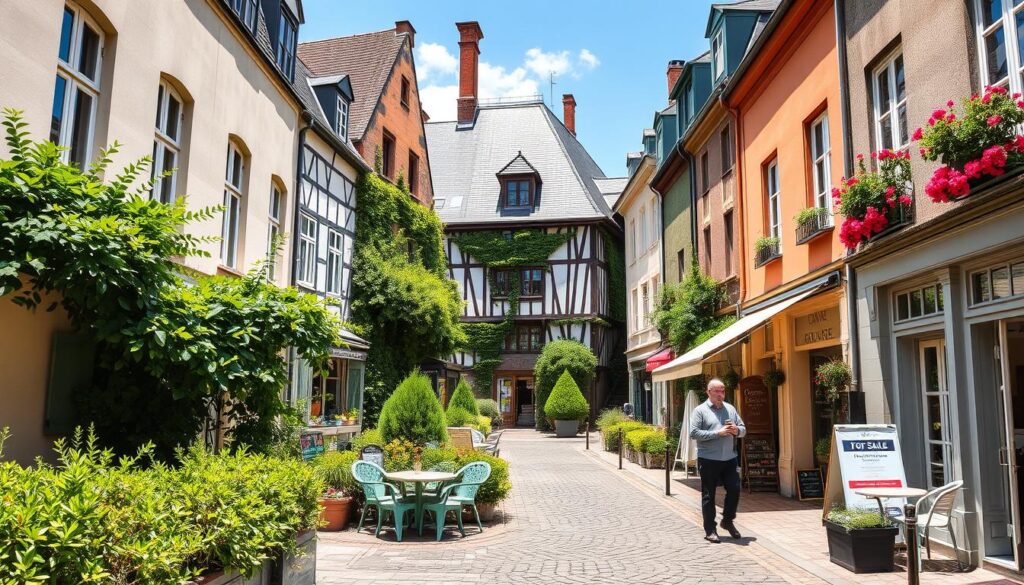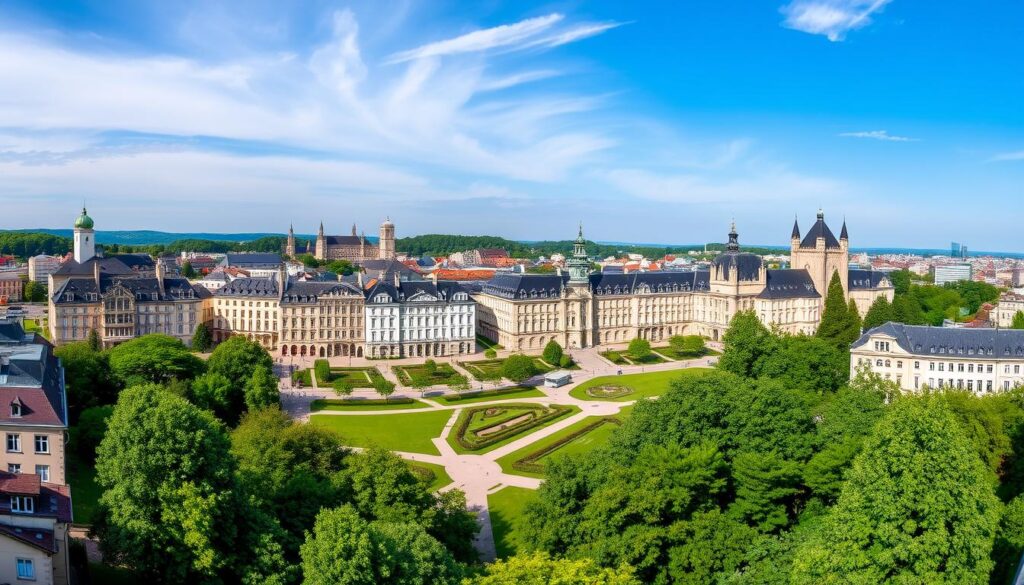Luxembourg, known for its thriving economy, cultural diversity, and picturesque landscapes, offers an attractive real estate market for foreigners. Unlike many other countries, Luxembourg allows foreign nationals, including both EU and non-EU citizens, to purchase real estate without any ownership restrictions. This includes buying land, residential properties, and commercial real estate, making it an enticing option for international investors.
One of the key aspects that make Luxembourg’s real estate market appealing is the significant growth in property prices. The residential property price index has shown consistent growth, with house prices in Luxembourg being 70% higher than the EU average in 20211. This upward trend not only reflects the robust demand for housing but also highlights the potential for capital appreciation, which is a significant draw for any property investor.
It is noteworthy that foreign buyers do not need residency to purchase real estate in Luxembourg. However, it is crucial to understand that owning property does not automatically grant residency rights. Those interested in moving to Luxembourg will need to comply with the necessary immigration regulations separately.
Key Takeaways: How to Buy a Property in Luxembourg
- Foreign nationals, including both EU and non-EU citizens, can buy real estate in Luxembourg without restrictions.
- The Luxembourg property market has witnessed substantial price growth, with house prices being 70% higher than the EU average1.
- Residency is not a requirement for purchasing real estate, but owning property doesn’t automatically grant residency rights.
- The attractive growth in property prices indicates strong potential for return on investment.
- Luxembourg’s real estate market caters to residential, land, and commercial property investments.
Contact us if you are Interested in Buying Property Abroad!
Introduction to Luxembourg’s Real Estate Market
The real estate market in Luxembourg is thriving, making it an attractive destination for investors. Luxembourg boasts one of the highest GDPs per capita globally, which further stimulates the property market2. This strong economic backbone supports the demand for residential and commercial properties, ensuring a stable investment climate.
Overview of Real Estate Trends in Luxembourg
Luxembourg real estate trends indicate a significant growth in demand, particularly in urban areas like Luxembourg City and Esch-sur-Alzette. Luxembourg’s central position in Europe ensures continuous demand for both residential and commercial properties2. The nation is known for its diverse real estate options, ranging from urban apartments to countryside homes2. Additionally, the country has a welcoming approach to foreign investments, which bolsters the market further2.
Average Property Prices and Growth
Property growth in Luxembourg has been remarkable, especially in prime areas. The country has seen a consistent rise in property values over the years. Luxembourg City, for example, exhibits higher property prices compared to other regions, reflecting the ongoing trend of escalating property rates. Buyers often face a requirement to place a deposit of 10% to 20% of the property price, with most banks offering mortgage loans to foreigners3. This steady price growth showcases the market’s robust health, attracting more investors each year.
Key Factors Driving Property Demand
Several factors drive property demand in Luxembourg. The nation’s transparent property laws, tax incentives, and ease of doing business play a pivotal role in its real estate success2. Moreover, the absence of a need for a residence permit to buy property and the equal treatment of foreign investors further stimulate interest3. The country’s strategic location at the heart of Europe makes commercial investments particularly lucrative, contributing significantly to the high property demand2. As Europe’s central hub, Luxembourg’s real estate market is poised for ongoing growth, offering a reliable investment avenue for both local and foreign investors.
For more detailed insights on the processes and legal procedures involved in buying property in Luxembourg, an informative guide is available here.
Legal Requirements for Foreign Investors in Luxembourg Real Estate

Foreign investors in Luxembourg are welcomed with almost no restrictions, making the Grand Duchy an attractive destination for real estate investment. Transparency is vital, especially concerning legal property ownership in Luxembourg. Understanding ownership rights, documentation, and the vital role of a notary is crucial for successful property acquisition.
Property Ownership Rights for Foreigners
Foreigners enjoy the same property ownership rights as local residents in Luxembourg, facilitating seamless investment opportunities. The Luxembourg Residence by Investment Program, initiated in 2017, significantly enhances the accessibility for global investors4. It allows individuals to become residents of Luxembourg within approximately six months by investing €500,000 or demonstrating an annual income of €27,0004. Additionally, Luxembourg boasts no restrictions on foreign investment in real estate5.
Documentation and Legal Procedures
Navigating the legal landscape involves meticulous attention to documentation and procedures. Essential legal documents include the Purchase Agreement, ensuring clarity on ownership status and possible encumbrances. Luxembourg’s corporate income tax rate for foreign investors is set at 18.19%, with an aggregate tax rate for investment rising to 24.94% in Luxembourg City, plus a 7% unemployment fund surcharge5.
Importantly, real estate transactions require careful handling of registration duties, which stand at a proportional 7% for property transfers4. Cumulatively, registration duties can escalate to 10% within Luxembourg City limits or remain around 7% outside the city5.
Importance of Hiring a Notary
Engaging a notary is indispensable in Luxembourg’s property transactions, ensuring rigorous compliance with local regulations. Notaries clarify legal property ownership in Luxembourg, preventing potential disputes. Notary fees typically amount to approximately 1.5% of the property’s value4. Given the legal complexities, hiring a notary facilitates a smoother transfer process and safeguards investor interests.
Can Foreigners buy Real Estate in Luxembourg

Foreign nationals have the same property ownership rights as locals, meaning they can freely purchase property in Luxembourg without any restrictions6. This is particularly appealing given the high demand in the country’s real estate market, which has grown at a rate of about 3% over the past decade6. Additionally, the rental rate for residential property stands at 4% per annum6.
The process of buying property, whether a house or an apartment, involves several steps, but it is comparatively straightforward. Buyers can complete the transaction within one and a half to two months7. It is recommended to consider the notary fees, which range between 7-10% of the transaction amount7.
The average cost for an apartment in Luxembourg is approximately 690,000 euros, while the average price of a house is around 1 million euros6. Prices are generally lower in the north of the country, potentially being halved6. Buyers must also be aware that they have 15 days after the real estate transaction registration to transfer the funds to the seller7.
Learn more about the comprehensive process and the favorable tax conditions available to new homeowners.
In addition, potential buyers should take into account the insurance costs, which can vary between 7,000 to 30,000 euros, depending on the loan specifics7. By understanding these factors, foreigners can effectively navigate the Luxembourg real estate market and make informed decisions when buying property in Luxembourg as a Foreigner.
Cost of Buying Property in Luxembourg

Luxembourg’s property market is known for its high costs, driven by significant demand and limited supply of housing. Prospective buyers must prepare for expenses including registration and notary fees, additional costs, and tax implications. Understanding these costs is crucial for effective planning and budgeting.
Registration and Notary Fees
When purchasing a property in Luxembourg, buyers are required to pay registration fees amounting to 7% of the property price, which includes a 6% registration fee and a 1% transcription fee1. Additionally, notary fees for managing the legal aspects of the transaction are set at 1.5% of the property’s price1. It is important for buyers to budget for these costs as part of the overall expense of acquiring property.
Additional Costs Involved
Beyond registration and notary fees, buyers should consider other expenses such as estate agent fees, which are commonly incurred since most property sales are managed by agencies like Wortimmo.lu, Athome.lu, and Immotop.lu8. Moreover, making a personal contribution of around 20% of the purchase price is often requested by mortgage providers8. Buyers may also face costs related to insurance, maintenance, and necessary repairs, adding to the overall financial commitment.
Tax Implications for Foreign Buyers
Foreign property owners in Luxembourg should be aware of various tax implications. Fortunately, Luxembourg offers favorable tax conditions, such as the tax-deductible nature of mortgage interest8. Moreover, the property tax in Luxembourg is extremely low8, and buyers can benefit from a tax abatement of up to 20,000 euros when purchasing a house or flat8. Understanding these tax benefits and obligations is essential to manage the long-term costs of real estate investment effectively.
Real estate costs in Luxembourghave seen a significant increase, with house prices averaging €1.2 million and apartment prices averaging €800,000 at the start of 20221.
Financing Options for Foreign Buyers

Understanding the financing options available is crucial for foreign buyers seeking to invest in the Luxembourg property market. Luxembourg offers various mortgage types and state assistance schemes to support both local and international property investors.
Mortgage Types and Requirements
Foreign buyer mortgage options Luxembourg include fixed-rate, variable, and adjustable-rate mortgages. Home buyers who took out mortgages in the first half of 2020 borrowed an average of 78% of the property’s value, with a third of loans granted for more than 90% of the property’s value9. The maximum term for a mortgage in Luxembourg is usually 30 years, but for younger borrowers, it can sometimes be extended to 40 years9. Foreign buyers generally need to provide a minimum down payment of 10%.
State Assistance Schemes
To facilitate property purchases, Luxembourg offers state assistance for property purchase Luxembourg through various schemes. The government guarantees the portion of a loan above 60% loan-to-value, covering up to 30% of the property’s value, with a maximum of €153,1359. Initiatives like the “Housing Pact” are in place to manage housing demand and development, providing subsidies or reduced tax rates for first-time homebuyers or those investing in energy-efficient homes10. These measures make it easier for foreign buyers to enter the market.
Interest Rates and Loan Terms
When considering interest rates and loan terms, it’s essential to note that, in May 2022, variable rate mortgages in Luxembourg averaged 1.36%, while fixed-rate mortgages averaged 2.05%9. Foreign buyers can choose from various interest rate options and loan terms up to 30 or sometimes 40 years, making Luxembourg’s property market accessible to a wider range of international investors9. Buyers should also be aware that homeowners in Luxembourg spent an average of 39% of their income on mortgage repayments in 20209.
The Process of Buying Real Estate in Luxembourg
The process of buying real estate in Luxembourg involves a structured series of steps that ensure smooth transactions and legal compliance. This journey includes identifying suitable properties, making offers and deposits, and culminating with the exchange of contracts and completion of the sale.
Finding a Suitable Property
Finding the right property is a critical first step in the process of buying real estate in Luxembourg. Prospective buyers can explore various online platforms like immotop.lu, athome.lu, wortimmo.lu, vivi.lu, and luxuryestate.com, which host numerous property listings11. Given the dynamic nature of Luxembourg’s real estate market, it is advisable to act quickly as properties tend to sell rapidly.
Making an Offer and Paying the Deposit
Once a suitable property is found, the next step involves making a formal offer to the seller. It’s common to negotiate terms before finalizing agreements. For off-plan properties, a 2% advance payment might be requested by the developer11. Additionally, ensuring that funds are available and manageable through a local bank account in Luxembourg can streamline the transaction process12.
Contact us if you are Interested in Buying Property Abroad!
Exchanging Contracts and Completing the Sale
After an agreement is reached, a preliminary sales agreement is signed, followed by a property title search and securing financing12. The exchange of contracts involves notary fees, and taxes are calculated based on the property’s agreed price and completion status11. The final sale agreement is signed before a notary, completing the purchase process and officially transferring ownership to the buyer. The overall completion time can vary, with up to 2 months for existing properties and 18 to 24 months for properties yet to be built11.
For more detailed information on the property purchase steps in Luxembourg, prospective buyers can refer to resources such as this comprehensive guide.
Investing in Luxembourg Properties as a Non-Citizen

Investing in Luxembourg properties as a non-citizen presents numerous attractive opportunities. Non-citizens can enjoy the benefits of a stable economy and robust property market. Luxembourg’s GDP per capita of $115,70013 signifies its wealth and economic stability, making it a prime location for property investment.
Investment Potential in Luxembourg
With a population of approximately 655,50013, Luxembourg offers a high demand for residential properties. The growth in citizen wealth translates to increased property values, providing a substantial Luxembourg property investment return. Real estate in Luxembourg typically experiences favorable appreciation, reflecting the country’s economic health and stability.
Popular Areas for Investment
Luxembourg City is a top choice for investors due to its central location and modern amenities. The surrounding communes also offer excellent investment opportunities, with diverse options ranging from urban homes to rural estates. These areas provide a variety of property types and price points, catering to different investor preferences and budgets.
Rental Yields and Return on Investment
Rental yields in Luxembourg range from 1.6% to 4.3%, indicating a solid return on investment. The rental market is strong, particularly in sought-after locations like Luxembourg City, where demand for quality rental properties remains high. This steady demand ensures that investing in Luxembourg properties as a non-citizen yields both immediate rental income and long-term capital appreciation.
Investors considering the Luxembourg market should be prepared to navigate local laws and regulations. Hiring a real estate agent or lawyer can simplify the process and ensure compliance with Luxembourg’s legal requirements. For more information on the legal intricacies and assistance with property investments in Luxembourg, visit this resource14.
The combination of economic stability with attractive rental yields underscores the promising outlook for property investment in Luxembourg. By carefully selecting properties in popular areas and leveraging local expertise, investors can maximize their returns in this thriving market.
Buying Property in Luxembourg City

Luxembourg City, with its thriving real estate market, offers a myriad of investment opportunities. As the capital, it stands out due to its financial center status and the presence of numerous international schools, making it an attractive location for real estate investments Luxembourg capital. Potential investors should be aware of the specifics involved and the advantages that come with purchasing property in this vibrant city.
Advantages of Investing in Luxembourg City
Investing in Luxembourg City real estate ensures access to a robust and stable market. The city’s international business hub status guarantees a steady influx of professionals, driving demand for both residential and commercial properties12. Additionally, having a local bank account simplifies transaction processes related to property12. There’s no limit on the number of properties one can own, enhancing the potential for portfolio diversification12.
Neighborhoods to Consider
Luxembourg City is divided into 24 distinct districts, each offering unique profiles and amenities. Popular ones include:
- Gare: Known for its central railway station and vibrant atmosphere.
- Belair: A residential area favored by families and expatriates.
- Kirchberg: The financial heart, housing various institutions and corporate offices.
- Limpertsberg: An upscale neighborhood, ideal for luxurious living.
These neighborhoods provide a mix of residential options from high-end apartments to family homes, catering to diverse investment needs and lifestyle preferences.
Price Trends and Availability
The real estate market in Luxembourg City is dynamic, with high prices often reflecting the strong demand11. The property purchasing process may require a physical presence or involvement of a legal representative in the country12. For instance, property prices in high-demand areas like Luxembourg City can significantly vary, emphasizing the importance of thorough market research12. Moreover, the timeline to complete a property purchase can be up to 2 months for existing properties with a mortgage, while off-plan properties might take 18-24 months11. This aspect is crucial for investors considering both immediate and future returns.
Ultimately, investing in property neighborhoods Luxembourg offers potential investors numerous strategic benefits, long-term value appreciation, and attractive rental yields. By understanding the market dynamics and making informed decisions, investors can capitalize on the promising opportunities in the heart of Luxembourg.
Luxembourg Real Estate Regulations for Foreigners
Navigating the Luxembourg Real Estate regulations for foreigners requires a deep understanding of several compliance aspects. Foreign investors must be well-informed about the local legal landscape to ensure a smooth property acquisition process in the Grand Duchy. Property buying compliance in Luxembourg is primarily managed by notaries, and government institutions generally do not heavily intervene in property transactions for foreigners.
Regulatory Framework and Compliance
The regulatory framework governing real estate transactions in Luxembourg is designed to ensure transparency and fairness. Foreign buyers are subject to the same property laws as local residents, which emphasize the importance of following established protocols. Compliance with these regulations involves submitting necessary documentation and adhering to legal procedures.
Restrictions and Permissions
Unlike many countries, Luxembourg does not impose special restrictions on foreign property buyers. However, acquiring a mortgage may require a substantial deposit, often up to 25% of the property’s value15. It’s also noteworthy that foreign investors are expected to comply with all local property buying compliance regulations, including paying notary fees, which are typically around 1.5% of the property price1.
Role of Government Institutions
Government institutions in Luxembourg play a limited but crucial role in real estate transactions for foreigners. Primarily, their involvement ensures that property laws are upheld and transactions are conducted fairly. They provide the legislative framework but delegate the hands-on compliance to legal professionals, notably notaries. Those looking to invest in Luxembourg Real Estate regulations for foreigners need to work closely with notaries to navigate the regulatory landscape smoothly.
Given these points, understanding the intricacies of Luxembourg Real Estate regulations for foreigners and ensuring thorough property buying compliance is crucial to successfully acquiring property in this highly sought-after market.
Residency and Citizenship Implications
Luxembourg offers a range of options for foreign investors seeking residency through property ownership. However, navigating the process of obtaining Luxembourg residency via real estate requires a solid understanding of the regulations and requirements. This section provides a detailed overview that will guide non-EU citizens on their path to residency and potential citizenship in Luxembourg.
Residency Permit by Investment
To qualify for a residency permit under the golden visa program in Luxembourg, investors need to make significant financial contributions. The options include a minimum investment of €500,000 in an existing or new business, €3 million in investment funds, or a substantial bank deposit of €20 million16. These pathways not only facilitate obtaining the necessary residency permit but also foster economic growth within Luxembourg’s business environment.
Requirements for Non-EU Citizens
Non-EU citizens must adhere to several specific requirements to gain residency through property ownership. Unlike simple property purchase, they must demonstrate a qualifying investment as outlined above. Importantly, permanent residency in Luxembourg can be sought after maintaining a continuous residence for five years16. This is a pivotal step towards fulfilling the long-term residency criteria in the country.
Path to Citizenship Through Property Ownership
Achieving Luxembourg citizenship entails more than just owning property. Non-EU citizens must reside in the nation for at least five years and gain proficiency in the Luxembourgish language16. This dedication shows the commitment required to integrate into Luxembourg’s society successfully. Additionally, having a Luxembourg passport provides substantial benefits, including visa-free access to 189 countries16. The journey from residency to citizenship through property ownership involves aligning with these criteria, reflecting a long-term investment in the country’s future.
Tips for Buying Real Estate in Luxembourg as a Foreigner
When diving into the Luxembourg real estate market, foreign buyers often encounter unique challenges. Understanding these complexities is crucial for a successful purchase. Here are some key real estate buying tips Luxembourg and strategies to assist in your property journey.
Common Challenges Faced by Foreign Buyers
Language barriers can be a significant hurdle for foreigners. While many Luxembourgers speak multiple languages, it’s advantageous to have professional assistance in Luxembourg property purchase to navigate legal and procedural jargon. Additionally, the high pace of market transactions demands agility and preparedness from buyers. Financial planning is another critical aspect, considering the high property prices, especially in cities like Luxembourg City, where average prices per square meter range from €8,000 to €12,00017.
Professional Assistance and Resources
Securing help from experienced professionals, such as legal advisors and real estate agents, is indispensable. These experts can guide you through the complex processes of property purchase and offer tailored advice. According to Expatica, estate agent commission in Luxembourg typically ranges from 3% to 5% of the final sale price and is usually paid by the seller18. It’s also essential to consider additional costs, like legal fees shared between buyer and seller for drafting and reviewing contracts18. For comprehensive resources, platforms such as Expatica Luxembourg prove invaluable, offering extensive insights for expats navigating the property market.
Long-term vs. Short-term Investment Strategies
When deciding between long-term and short-term investment strategies, consider factors such as residency status, mortgage constraints, and personal investment goals. Luxembourg’s property market is known for its stability, making long-term investments appealing due to consistent property value rises. Rental properties in Luxembourg present gross rental yields ranging from 1.6% to 4.3%17. This highlights the potential for steady rental income. Comparing different regions can also inform strategy; for instance, while prices in Luxembourg City are high, areas like Echternach and Diekirch offer more affordable options with prices between €4,000 and €7,000 per square meter17.
Overall, foreign buyers are encouraged to diligently analyze their financial and personal circumstances, seek the appropriate professional assistance, and consider their investment timeline when purchasing property in Luxembourg. This approach ensures a well-informed, strategic entry into this dynamic real estate market.
Conclusion
In summary of buying property in Luxembourg as a foreigner, the Grand Duchy offers substantial opportunities in its real estate sector for foreign investors. Despite fluctuating trends, such as a marked decrease in residential sector investments of over 60% between the second quarter of 2022 and the second quarter of 2023 and a similar dip in the sale of building lands by more than 50%19, Luxembourg remains an attractive market. This decline underscores the importance of understanding market dynamics and long-term potential when making investment decisions.
Foreign investment Luxembourg real estate involves navigating a landscape shaped by both encouraging and stringent legal frameworks. Luxembourg law does not restrict foreign investment in real estate, providing an open door for international buyers19. However, the recent introduction of a screening mechanism for foreign direct investments aimed at protecting national security and public order is also noteworthy19. On the financial front, it’s crucial to consider comprehensive costs including registration, notary fees, and potential buyer’s agent commissions, which typically range from 3% to 5% of the final sale price18.
Ultimately, successful property investments in Luxembourg require strategic planning and leveraging available resources. The anticipated increase in rents, particularly for office spaces by the second quarter of 2024, reflects a potential area of growth19. With a robust understanding of legal requirements, costs, and market trends, foreign investors can capitalize on Luxembourg’s promising real estate opportunities, potentially reaping long-term benefits like residency or citizenship. Investing in real estate here, therefore, warrants detailed attention, but holds the promise of significant returns.
Contact us if you are Interested in Buying Property Abroad!
FAQ
Can Foreigners buy Real Estate in Luxembourg?
Yes, foreigners can buy real estate in Luxembourg without restrictions. Both EU and non-EU citizens enjoy equal property ownership rights, and there is no requirement for residency to purchase property.
What are the average property prices in Luxembourg, especially in Luxembourg City?
The average property prices in Luxembourg City are considerably higher than in other regions. The property price index indicates consistent growth, reflecting the stable demand in the market.
What are the legal requirements for foreign investors in Luxembourg real estate?
Foreign investors must follow standard legal procedures, which include signing a Purchase Agreement and hiring a notary to ensure compliance with Luxembourg’s regulations. Notary fees typically amount to 1.5% of the property’s value.
Do foreign real estate owners need to meet specific documentation and legal procedures?
Yes, foreign buyers need to prepare the necessary legal documents, including the Purchase Agreement, and ensure they are free from legal encumbrances. Employing a notary is mandatory to facilitate these processes.
Are there additional costs involved in buying property in Luxembourg?
Yes, purchasing property in Luxembourg involves various costs such as registration fees, notary fees, and possibly estate agent fees. Buyers should also consider potential tax implications.
What financing options are available for foreign buyers in Luxembourg?
Foreign buyers can access various mortgage options, including fixed-rate, variable, and adjustable mortgages, with terms up to 30 years. A minimum 10% deposit is generally required, and Luxembourg provides state assistance for first-time buyers in the form of loan guarantees and flexible loans.
What is the process of buying real estate in Luxembourg?
The process involves searching for suitable properties, making offers, paying deposits, and completing legal steps like hiring a solicitor and arranging surveys. The transaction concludes with contract exchange and sale completion through a notary.
Is investing in Luxembourg properties beneficial for non-citizens?
Yes, investing in Luxembourg properties offers promising potential with rental yields between 1.6% and 4.3%, driven by a stable economy and rising property values. Key investment areas range from Luxembourg City to neighboring communes.
What are the advantages of investing in Luxembourg City?
Luxembourg City is a prime location for real estate investment due to its status as a financial hub, presence of international schools, and diverse neighborhood profiles. While the property prices are higher, the investment return is substantial.
Are there residency and citizenship implications for foreign property owners in Luxembourg?
Owning property in Luxembourg does not grant automatic residency. Non-EU citizens must follow standard visa processes. Long-term residency requires additional criteria like employment, with potential for citizenship after a prolonged period of residence.
What are some common challenges faced by foreign buyers purchasing property in Luxembourg?
Foreign buyers may face challenges such as language barriers, understanding the local market, and navigating financial planning. It is advisable to seek professional assistance from real estate agents and legal advisors to ensure a smooth transaction.
Source Links
- https://www.expatica.com/lu/housing/buying/buying-real-estate-in-luxembourg-696063/
- https://www.alistairmcleod.com/investing-in-luxembourg-real-estate/
- https://www.grannville.com/post/guide-to-property-acquisition-in-luxembourg
- https://immigrantinvest.com/blog/luxembourg-residence-by-investment-en/
- https://www.lexology.com/library/detail.aspx?g=b021acd6-01d7-492c-8f4a-c6a6e09c5074
- https://geoln.com/real-estate/luxembourg
- https://luxtoday.lu/en/knowledge/purchasing-a-house-in-luxembourg-how-to
- http://www.axa.lu/en/blog-home-becoming-homeowner-luxembourg
- https://www.expatica.com/lu/housing/buying/mortgages-in-luxembourg-766759/
- https://www.finbri.co.uk/bridging-loan/bridging-loan-guide/buying-property-in-luxembourg
- https://www.angloinfo.com/how-to/luxembourg/housing/buying-property
- https://investropa.com/blogs/news/luxembourg-us-citizen-property-ownership
- https://citizenmatch.com/residency-programs/europe/luxembourg/
- https://globalresidenceindex.com/news-luxembourg-residence-investment/
- https://www.ing.lu/webing/content/siteing/en/Individuals/my-money/categories/borrow/renting-or-buying-a-property-when-arriving-in-luxembourg.html
- https://expatmoney.com/blog/luxembourg-residency-by-investment
- https://investropa.com/blogs/news/luxembourg-real-estate-foreigner
- https://www.expatfocus.com/luxembourg/guide/luxembourg-finding-property-to-buy
- https://www.loyensloeff.com/lexology-in-depth—real-estate-law-luxembourg-chapter.pdf

Comments